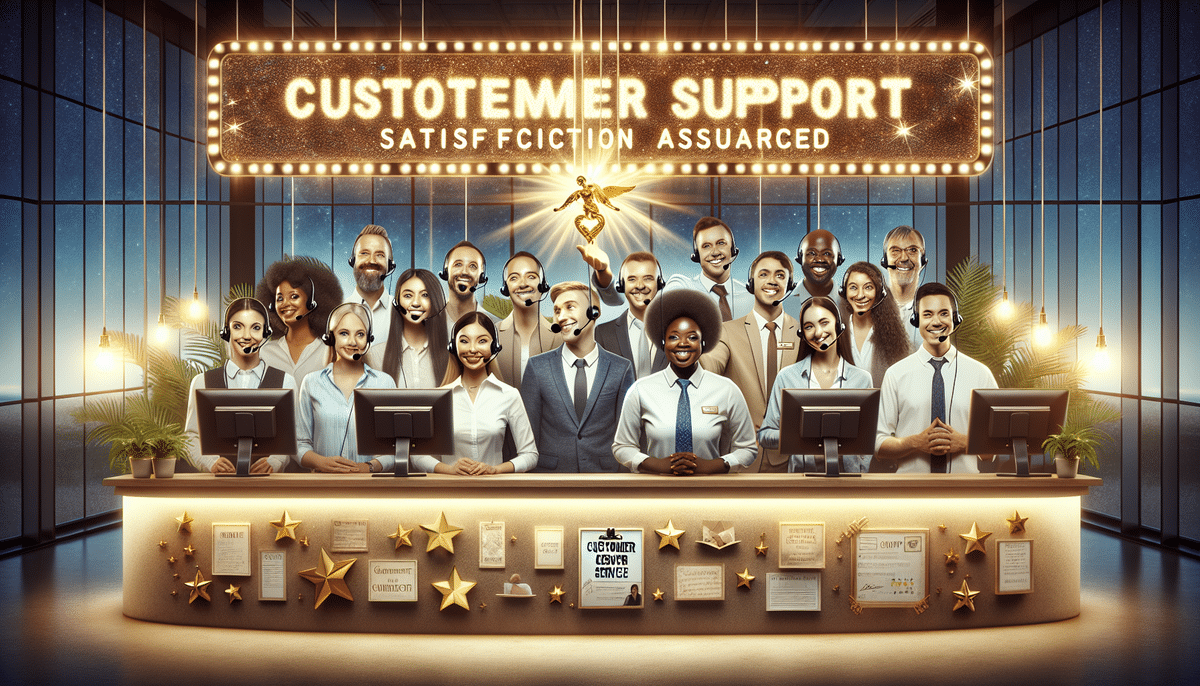The Importance of Excellent Customer Service
Providing excellent customer service is crucial for the success of any business. It not only creates a positive reputation for companies but also leads to increased customer loyalty, ultimately translating into higher profits. In today's ultra-competitive business environment, high-quality customer service is no longer optional but a necessity. This article delves into why excellent customer service is essential, the factors that contribute to it, and strategies for delivering exceptional customer service.
Impact of Customer Service on Business Success and Brand Loyalty
How Customer Service Impacts Business Success
Customer service serves as the face of your business, representing the first impression customers have during their interactions. It can be the deciding factor in whether they choose your company over competitors. According to a Statista report, companies that prioritize customer service see a 20% increase in customer satisfaction scores, leading to higher revenue and profitability.
Moreover, customer service goes beyond resolving complaints or answering questions. It's about building relationships and creating positive experiences. When customers feel valued and appreciated, they are more likely to become loyal advocates for your brand, spreading positive word-of-mouth and attracting new customers. Investing in customer service training and resources is crucial for businesses of all sizes, significantly impacting long-term success and growth.
The Role of Customer Service in Building Brand Loyalty
Customer loyalty is a critical component of any successful business. It is more cost-effective to retain existing customers than to acquire new ones. Providing excellent customer service is the best way to build brand loyalty, as satisfied customers are more likely to become repeat buyers and brand ambassadors. Additionally, Forbes reports that 70% of buying experiences are based on how customers feel they are being treated.
Loyal customers tend to spend more and purchase additional products or services, contributing to increased sales and revenue. Furthermore, exceptional customer service differentiates your business from competitors, creating a unique selling proposition that attracts and retains customers, essential for sustainable growth and profitability.
Key Factors and Strategies for Exceptional Customer Service
Factors that Contribute to Excellent Customer Service
- Timely Response: Quick responses to inquiries and complaints show customers that their concerns are a priority.
- Empathy and Understanding: Demonstrating empathy helps in building a connection with customers.
- Personalized Attention: Tailoring interactions to individual customer needs enhances their experience.
- Proactive Problem-Solving: Anticipating and addressing potential issues before they escalate.
Companies that cultivate a customer-centric culture and invest in employee training and development can consistently deliver high-quality customer service. Additionally, anticipating customer needs through data analysis and feedback helps exceed expectations and build long-lasting relationships.
Strategies for Delivering Exceptional Customer Service
- Prioritize the Customer Experience: Listen to feedback, respond promptly, and personalize assistance to exceed expectations.
- Empower Employees: Allow employees to make decisions that benefit the customer, increasing their motivation and satisfaction.
- Establish a Culture of Empathy: Train employees to understand and relate to customers' perspectives, treating them with kindness and respect.
- Leverage Technology: Utilize chatbots and automated responses to provide quick and efficient solutions.
Implementing these strategies can lead to improved customer satisfaction, loyalty, and positive word-of-mouth referrals.
Leveraging Technology to Enhance the Customer Experience
Technology plays a pivotal role in enhancing the customer experience. Implementing AI-powered tools like chatbots can provide instant, 24/7 customer service, handling common inquiries efficiently. Additionally, data analytics can identify customer trends and preferences, allowing for more personalized interactions.
Social media platforms offer opportunities for real-time customer engagement and support, fostering stronger connections and timely responses. By integrating these technologies, businesses can provide seamless and efficient customer experiences.
Employee Training and Development for Outstanding Customer Service
Understanding the Needs and Expectations of Customers
Customers expect prompt responses, personalized attention, and seamless experiences across all channels. Understanding these needs is critical to delivering exceptional customer service. Gathering feedback through surveys, focus groups, and social media provides valuable insights into customer preferences and areas for improvement.
Staying up-to-date with industry trends and emerging technologies also helps businesses anticipate and meet evolving customer expectations, ensuring they remain competitive and relevant.
How to Train Employees to Provide Great Customer Service
Employee training and development are paramount for delivering excellent customer service. Regular training sessions focusing on empathy, communication skills, problem-solving, and customer satisfaction empower employees to perform confidently and effectively.
Ongoing feedback and coaching through performance evaluations and one-on-one meetings help employees continuously improve their skills and feel supported in their roles.
The Benefits of Investing in Customer Service Training and Support
Investing in customer service training offers numerous benefits, including enhanced employee skills, increased customer satisfaction, improved retention rates, and a stronger brand reputation. These benefits translate into higher revenue and profitability, making it a valuable investment for any business.
Additionally, well-trained customer service representatives can identify areas for improvement in products or services, address customer concerns proactively, and act as brand ambassadors, promoting the business and its values effectively.
Avoiding Common Customer Service Mistakes
Common Mistakes to Avoid When Providing Customer Service
Common mistakes in customer service include:
- Failing to respond promptly and empathetically to inquiries.
- Providing generic and unhelpful responses.
- Not taking ownership of customer issues.
- Inadequate training for customer service representatives.
- Lacking a clear and accessible customer service policy.
These mistakes can lead to dissatisfied customers, negative reviews, and decreased profits. Ensuring prompt, personalized, and effective responses while maintaining a clear service policy and providing adequate training can help avoid these pitfalls.
Tips for Handling Difficult Customers and Situations with Grace
Handling difficult customers requires empathy, patience, and professionalism. Here are some tips:
- Remain Calm and Composed: Avoid escalating the situation by staying level-headed.
- Active Listening: Understand the customer's perspective by listening attentively.
- Take Ownership: Acknowledge the issue and commit to resolving it.
- Offer Creative Solutions: Present multiple options to satisfy the customer's needs.
- Find Common Ground: Seek areas of agreement to build rapport and facilitate resolution.
By applying these strategies, businesses can turn negative experiences into positive outcomes, reinforcing customer trust and loyalty.
Measuring and Enhancing Customer Service Effectiveness
Measuring the Effectiveness of Your Customer Service Efforts
Measuring customer service effectiveness is essential for continuous improvement. Key metrics include:
- Customer Satisfaction Scores (CSAT): Gauge overall satisfaction with service interactions.
- Net Promoter Score (NPS): Measure the likelihood of customers recommending your business.
- Response Times: Track how quickly customer inquiries are addressed.
- Resolution Rates: Assess the effectiveness of issue resolution.
Utilizing these metrics helps identify strengths and areas needing improvement, enabling businesses to enhance their customer service strategies effectively.
The Connection Between Excellent Customer Service and Repeat Business
Providing excellent customer service leads to increased customer loyalty and repeat business. Retaining existing customers is more cost-effective than acquiring new ones, as loyal customers tend to spend more and refer others. According to a Bain & Company study, increasing customer retention rates by just 5% can boost profits by 25-95%.
Investing in customer service creates a dedicated customer base and a solid reputation, driving long-term success for the business.
Examples of Exceptional Customer Service
Examples of Companies with Exceptional Customer Service
Several companies are renowned for their exceptional customer service:
- The Ritz-Carlton: Known for personalized service and attention to detail.
- Zappos: Emphasizes a customer-first culture with a focus on satisfaction.
- Amazon: Offers extensive support options and a seamless shopping experience.
- Southwest Airlines: Prioritizes friendly and efficient service, fostering customer loyalty.
These companies have built strong customer-centric cultures, consistently delivering personalized and exceptional service that sets them apart in their respective industries.
Future Trends and Predictions in Customer Service
The Future of Customer Service: Trends and Predictions
The future of customer service is evolving with emerging trends:
- AI-Powered Tools: Increased use of artificial intelligence for personalized and efficient service.
- Omnichannel Communication: Seamless integration across multiple channels for a consistent customer experience.
- Proactive Customer Service: Anticipating customer needs and addressing issues before they arise.
- Enhanced Data Security: Ensuring customer data protection to build trust and compliance.
Staying ahead of these trends and investing in innovative customer service solutions will enable businesses to meet evolving customer expectations and maintain a competitive edge.
Conclusion
Providing excellent customer service is critical for the success of any business. It creates a positive reputation, boosts customer loyalty, and ultimately translates into increased revenue and profitability. By prioritizing the customer experience, investing in employee training, and measuring the effectiveness of customer service efforts, businesses can consistently deliver exceptional service that meets and exceeds customer expectations. The future of customer service is bright, and companies that focus on creating customer-centric cultures will stay ahead of the curve and achieve long-term success.






















